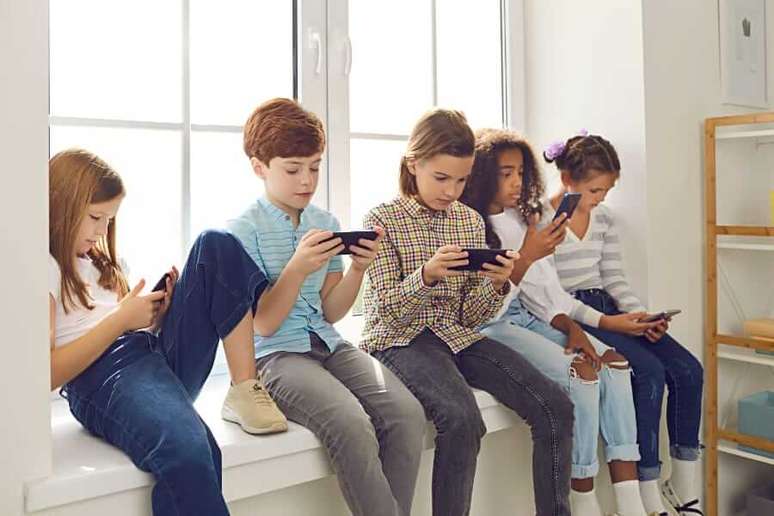The cell phone is much more practical and brings a false peace of mind, warns an expert
html[data-range=”xlarge”] figure image img.img-59e84aadc5a004640becec52c22da0198twkm6jg { width: 774px; height: 516px; }HTML[data-range=”large”] figure image img.img-59e84aadc5a004640becec52c22da0198twkm6jg { width: 548px; height: 365px; }HTML[data-range=”small”] figure figure img.img-59e84aadc5a004640becec52c22da0198twkm6jg, html[data-range=”medium”] figure image img.img-59e84aadc5a004640becec52c22da0198twkm6jg { width: 564px; height: 376px; }HTML[data-range=”small”] .article__image-embed, html[data-range=”medium”] .article__image-embed { width: 564px; margin: 0 auto 30px; }
Compete with video games, social networks, movies, series and cartoons; Be more attractive than dances, trends and stickers; Capturing attention without technology or audiovisual aids; This is the battle faced daily by parents and guardians around the world when it comes to entertaining and developing the brains of children and teenagers. A difficult mission that is almost always won by the screens.
But that doesn’t have to be the case. With a little dedication and creativity, it’s possible to divert the glassy gaze of cell phones and computers to more lucrative pursuits.
According to the specialist in Educational Psychology and Inclusive Education of the schools of the Grupo Positivo, Michele Norberto, one must beware of the trap of practicality.
“The cell phone is much more practical and brings a false peace of mind. If we and the environment in which we live are not prepared to deal with the child, we will put ourselves at a crossroads and end up giving him the cell phone, because it is the easiest thing to do ”, she warns.
prepare the environment
To prevent this from happening, according to Michele, adults should think in advance of preparing the home environment – and the necessary objects – so that the child can entertain himself without resorting to screens.
“If you remove the screen, there must be other possibilities for this child. Of course, in a house there are things that belong to adults and it is important to agree with the child what they are, where he cannot touch them. But, apart from that, it is essential to create an environment in which the little ones have autonomy”, explains the early childhood education teacher and 1st year consultant of the Grupo Positivo schools, Júlia Assis.
According to her, toys should be close at hand and daily activities, such as brushing your teeth, should be done in a safe environment. Experts offer some tips to get children’s attention to offline experiences.
Contact with nature
Contact with the environment is very important because it offers a series of experiences that contribute to the child’s development. Different sensations stimulate the senses and play a vital role in human life.
“The textures and smells and everything in between go far beyond the stimuli present on the screen, which are more visual and auditory. Also, if the child doesn’t like what he sees on the screen, move on. And then you can’t think about what you like and what you don’t like. Contact with the natural world also allows her to get to know herself”, underlines Michele.
Interaction and follow-up
Up to two years is the stage in which the human brain develops the most. Therefore, the time spent with children of this age group must always be of quality. It doesn’t matter if parents have many hours on their hands or only 40 or 50 minutes a day, they need to focus on interacting with their children in that moment.
Turning off your cell phone or muting notifications, talking to your child, playing games, asking about their day, and even actively watching them play are ways to do this.
If they are outdoors, in nature, try to accompany and mediate this contact, encouraging her to explore and discover things. If they are in a restaurant, for example, activities that replace screens should be offered.
“Assemble a first aid kit, with books, colored pencils, pieces of paper, clay, in short, resources that prevent her from getting bored and starting to ask for her cell phone,” Júlia teaches.
example and communication
An AVG survey found that 71% of parents in Brazil believe they are checking their smartphone too much, while 87% of children agree with this perception. Children who notice that their parents are always looking at their cell phones tend to believe that this is normal behavior and, even worse, to repeat it.
Leading by example is therefore essential. And this can be done by communicating when there is a need to be on the phone, explaining that this is part of the job and that it is an adult thing, but also verbalizing when it is time to put the device aside and focus on something else. activity.
Júlia points out that this communication can be done in a natural way: “you can say ‘now I’m with you and this is our moment to play, so our attention is here for this moment’. Communicating it to the child helps to lower anxiety, calm him down and show him an example to follow”.
Rules
The so-called “combinados” are an indispensable part of the education of the little ones. It is through them that the family establishes the rules that guide the daily dynamics. Time to play, study and sleep, moments of leisure and food, prohibition and permission, limits and everything that interferes with routine must be part of these agreements.
“Every family has its own disposition and that goes for screen time too. Because children have access to screens and it is very difficult to avoid it, but establishing this time is fundamental,” explains Júlia.
Experimentation
The more different experiences you offer, the more your child will be interested in non-screen activities. But beware: adult mediation must always be present.
“It takes planning, observing what is suitable for each age group, and also the exchange of experiences, bringing more information about what is happening, enriching the experience,” says Michele.
She also says it’s important to verbalize to your child where they are going and what they can expect from the trip, including the “bad” parts, such as queues. Museums, movies, plays, concerts, picnics, games suitable for all ages, activities involving paper, pen, colored pencils, crayons, modeling clay, among others, are great options for exercising these experiences.
Furthermore, asking for help with household chores, also respecting the limits and possibilities of each age group, is another way of interacting with the little ones, encouraging them to stay away from screens with activities that will attract their attention.
HOMEWORK inspires transformation in the world of work, in business, in society. Created by Compasso, a content and connection agency.
Source: Terra
Ben Stock is a lifestyle journalist and author at Gossipify. He writes about topics such as health, wellness, travel, food and home decor. He provides practical advice and inspiration to improve well-being, keeps readers up to date with latest lifestyle news and trends, known for his engaging writing style, in-depth analysis and unique perspectives.





![Everything starts here: What are you waiting for on Tuesday, July 22, July 22, 2025 [SPOILERS] Everything starts here: What are you waiting for on Tuesday, July 22, July 22, 2025 [SPOILERS]](https://fr.web.img2.acsta.net/img/52/4a/524a493b6d4b1233fce62af9a6caf759.jpg)



